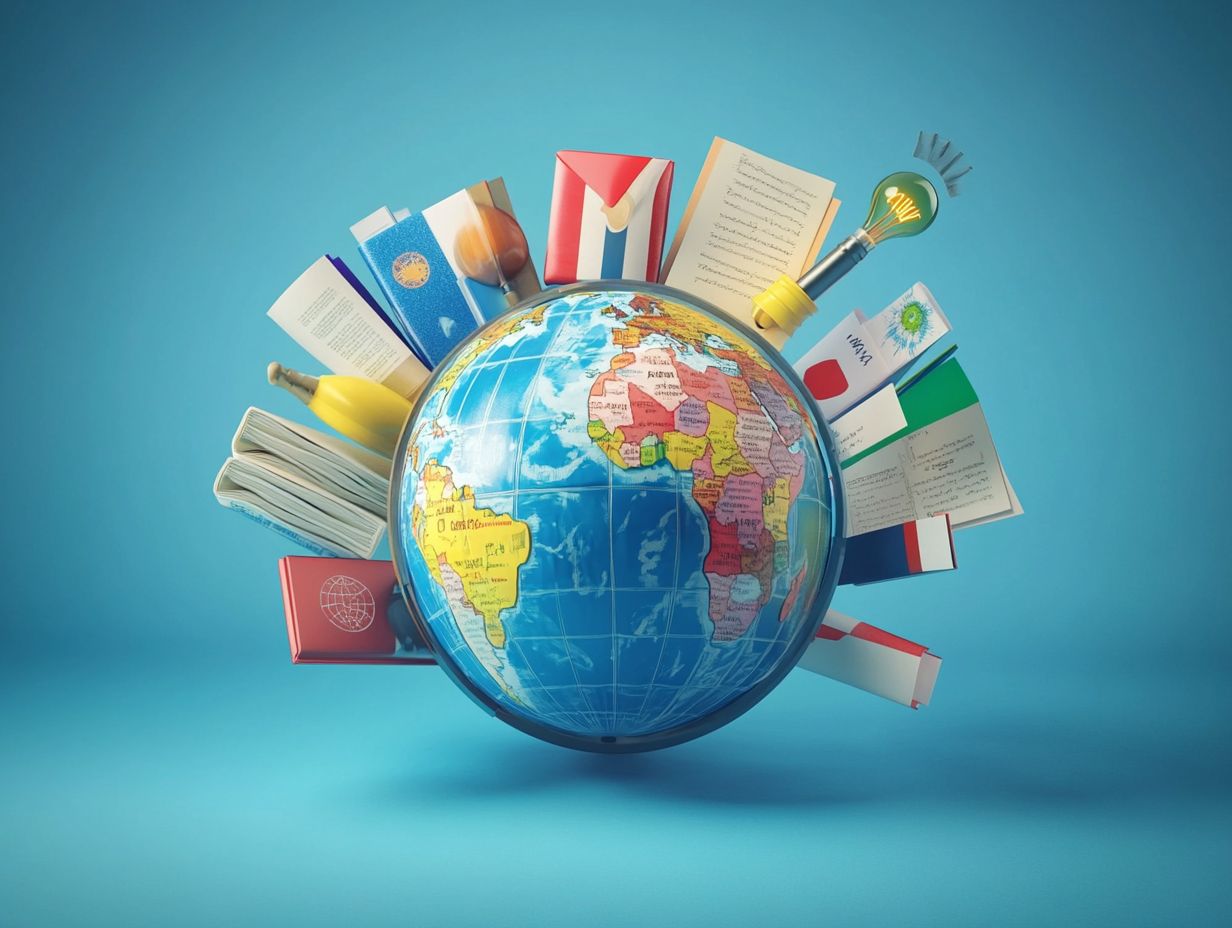International Copyright Treaties You Should Know
In our connected world, understanding international copyright treaties is crucial for both creators and consumers. These agreements protect artistic and literary works while fostering innovation and cultural exchange across borders.
This exploration highlights the importance of international copyright protection. We’ll discuss key treaties that shape these laws and how enforcement mechanisms work in practice.
You ll learn about the challenges posed by digital content. Together, we will uncover how evolving solutions protect creators’ rights online.
Contents
Key Takeaways:

International copyright treaties protect the rights of creators and consumers globally. Key treaties like the Berne Convention, Universal Copyright Convention, and TRIPS play a crucial role in ensuring copyright protection in international contexts across borders.
The World Intellectual Property Organization (WIPO) plays a crucial role in enforcing these treaties. Legal remedies are available for copyright infringement.
What are International Copyright Treaties?
International copyright treaties are legal frameworks that protect creators’ rights and enforce copyright laws globally. Treaties such as the Berne Convention and the WIPO Copyright Treaty set minimum standards for protection.
These treaties harmonize copyright laws and address infringements, fostering creativity and innovation. The Berne Convention, established in 1886, was one of the first agreements to grant creators rights across multiple countries.
Today, the WIPO Copyright Treaty enhances the protection of digital works. It highlights the importance of copyright in the internet age.
These legal agreements empower creators by granting control over their work. They also ensure a rich variety of content for consumers while respecting creators’ rights.
Enforcing these rights requires collaboration among nations. Adhering to these treaties is essential for combating piracy and ensuring fair compensation for creative contributions.
The Importance of International Copyright Protection
International copyright protection safeguards your intellectual property rights. It ensures that your creative works are protected from unauthorized use or reproduction.
This legal framework nurtures creativity and drives economic growth. It provides you with a fair means to receive compensation for your efforts.
Copyright education raises awareness about the importance of enforcing these rights. It helps you navigate the complexities of copyright laws in a digital world.
Benefits for Creators and Consumers
The benefits of international copyright treaties are many, extending their advantages to both creators and consumers. These treaties help the creative industry thrive. They also give consumers access to a variety of protected works.
For you as a creator, these legal agreements establish minimum standards for copyright protection. They offer automatic safeguarding of your creations while providing a solid legal foundation in the event of copyright infringements.
As a consumer, you can enjoy diverse creative outputs, secure in the knowledge that these works are protected by laws that uphold copyright permissions and promote fair use, especially in online distribution.
These legal frameworks enable you as an artist or author to dedicate your time and resources to innovative projects without the fear of losing your intellectual property. Picture a musician confidently sharing their latest tracks, fully aware that unauthorized copies can be legally thwarted.
Meanwhile, as a consumer, you benefit from enjoying these works, often at a more accessible price thanks to healthy competition.
This balance keeps the marketplace lively and encourages creators to collaborate and innovate, inviting them to explore new genres and styles. Ultimately, this enriches the cultural landscape for everyone involved.
Key International Copyright Treaties
Key international copyright treaties serve as the backbone of global copyright law, offering a cohesive framework that harmonizes copyright protections across nations.
Among these, the Berne Convention for the Protection of Literary and Artistic Works lays the groundwork for essential copyright principles. The WIPO Copyright Treaty adapts these protections for the digital age, addressing the unique challenges posed by internet transmission and digital content.
The TRIPS agreement is crucial for setting minimum standards for intellectual property enforcement. It shapes copyright laws in regions such as the European Union and beyond.
Berne Convention for the Protection of Literary and Artistic Works

The Berne Convention for the Protection of Literary and Artistic Works is an important treaty that lays the groundwork for copyright protection on a global scale. It guarantees that creators like you receive automatic protection for your works without the hassle of registration.
This treaty also upholds the moral rights of authors and establishes the principle of national treatment. This means you, as a foreign creator, get the same rights as local authors in member countries. Its significance is evident in how it has shaped national copyright laws and contributed to the harmonization of copyright standards worldwide.
By emphasizing the importance of safeguarding your rights as an author or artist, the Berne Convention has been instrumental in promoting cultural exchange and protecting intellectual creativity across various jurisdictions. Since its inception in 1886, it has sparked the development of robust copyright frameworks in numerous nations, ensuring that you can truly benefit from your contributions.
The Convention has created an environment where enforcement measures have been strengthened, giving you greater confidence that your works will be protected from unauthorized use and infringement. This alignment of copyright regulations encourages international collaboration and opens up pathways for global access to a rich tapestry of creative expressions.
Universal Copyright Convention
The Universal Copyright Convention (UCC) offers an alternative framework for copyright protection. It is designed for countries struggling to adopt the Berne Convention.
The UCC establishes a pathway for international copyright law. It emphasizes the importance of copyright protection while considering the diverse needs of various nations.
This flexibility is crucial in today s digital landscape. Countries can protect creative works in ways that suit their unique contexts.
Unlike the Berne Convention, the UCC has a more lenient framework. This aligns with different legal environments worldwide.
As nations navigate the complexities of digital content, understanding the adoption of the UCC is more important than ever. This ongoing conversation highlights the need for harmonization in our interconnected world.
Agreement on Trade-Related Aspects of Intellectual Property Rights (TRIPS)
The TRIPS Agreement is a key treaty established by the World Trade Organization (WTO). It sets minimum standards for copyright and intellectual property rights protection globally.
This agreement requires member countries to implement and enforce copyright protections. These protections should ideally exceed the established standards to create a secure environment for creators.
TRIPS also addresses copyright infringements effectively. It ensures that member countries stick to established legal frameworks.
It also works well with existing treaties like the Berne Convention, which focuses on authors’ rights. TRIPS provides a comprehensive baseline for IP protection that supports earlier agreements.
Challenges can arise, especially in developing countries where resources may be limited. These issues lead to varied interpretations and implementations, impacting fairness for artists worldwide.
While TRIPS aims to create uniform copyright standards, the path to compliance has many obstacles.
How International Copyright Treaties are Enforced
Enforcing international copyright treaties is vital for safeguarding creators’ rights. Effective mechanisms tackle infringements and offer legal remedies to those affected.
This requires collaboration among member countries and organizations like the World Intellectual Property Organization (WIPO). They educate creators on their rights and what to do if their works are violated.
By promoting respect for copyright, these efforts support a healthy creative ecosystem.
Role of World Intellectual Property Organization (WIPO)
The World Intellectual Property Organization (WIPO) plays an important role in the global framework of copyright protection and enforcement. As a specialist agency of the United Nations, it aims to balance the rights of creators with the public’s access to knowledge.
WIPO administers several international treaties, including the WIPO Copyright Treaty. This treaty lays the groundwork for adapting copyright laws to the digital landscape.
Through its educational initiatives and resources, WIPO helps member states enhance their IP rights enforcement. This support strengthens the protection of creative works.
WIPO also engages in capacity-building initiatives. These initiatives assist countries in creating effective legal frameworks that meet international standards.
The organization provides workshops, training sessions, and online tools. These resources equip national authorities and creators with essential knowledge to tackle copyright challenges in today’s digital age.
As technology evolves, WIPO faces ongoing challenges like digital piracy and rapid changes in content distribution. These issues require continuous innovation in policy-making and education to maintain harmony between creators’ rights and public access.
Legal Remedies for Copyright Infringement

As a creator, legal remedies for copyright infringement are vital tools. They allow you to protect your rights and seek help when someone uses your work without permission.
These remedies can include:
- Injunctions
- Monetary damages
- Statutory damages
These options deter infringers and compensate you for losses. It is vital to enforce these legal options effectively to protect your rights!
For example, a prominent music artist successfully sued a streaming service for using her songs without authorization. The court awarded her statutory damages, showcasing the power of monetary remedies.
Pursuing legal action can be daunting. High costs, long timelines, and the need for solid evidence can overwhelm many creators.
This is why a strong enforcement framework is necessary. It enables you to tackle infringement and reclaim your investments in your creative work.
Impact of International Copyright Treaties on Digital Content
International copyright treaties are crucial in shaping the protection and distribution of digital content. They address the unique challenges posed by online sharing and the evolving nature of creative works.
As technology changes how creators share their masterpieces, these treaties create a vital framework for copyright protection. They ensure you retain your rights while navigating the digital landscape.
The flexibility of agreements like the WIPO Copyright Treaty highlights the need for copyright law to evolve. Keeping up with rapid technological advancements is essential!
Challenges and Solutions for Protecting Digital Content
Protecting digital content poses a multitude of challenges. Many copyright violations and effortless unauthorized distribution run rampant across the Internet.
We need innovative solutions to address these issues and safeguard creators’ rights in an increasingly digital marketplace.
As you navigate this dynamic landscape, you may often find yourself facing situations where your work is shared without your consent. This can adversely affect both your financial stability and creative inspiration.
High-profile cases, like the unauthorized streaming of films and music, underscore the pressing need for a robust framework to tackle these challenges.
Potential solutions could encompass:
- Implementing adaptive licensing models that resonate with the digital age,
- Employing advanced technological measures such as watermarking and blockchain,
- Fostering educational initiatives that cultivate a culture of respect for intellectual property.
By combining these strategies, we can create a better environment for digital creators.
Frequently Asked Questions
What is an international copyright treaty?
An international copyright treaty is a legally binding agreement between multiple countries to protect and regulate intellectual property rights across borders.
What is the purpose of international copyright treaties?

The purpose of these treaties is to establish a set of standards and guidelines for the protection and use of intellectual property. This promotes creativity, innovation, and economic growth.
How many international copyright treaties are there?
There are currently 26 international copyright treaties in existence, including the Berne Convention, WIPO Copyright Treaty, and the TRIPS Agreement.
Why is it important to know about these treaties?
Knowing about these treaties is important for creators, businesses, and consumers. Understanding their rights and obligations when it comes to using and sharing intellectual property across borders is essential.
Do these treaties apply to all countries?
No, these treaties only apply to the countries that have ratified or acceded to them. It is important to check which treaties a particular country is a member of to understand the specific laws and regulations that may apply.
What are some common issues addressed in these treaties?
Some common issues addressed in these treaties include the protection of copyrights for literary, artistic, and scientific works. This also includes the recognition of moral rights of authors and the enforcement of intellectual property rights.






